Sarah Leah Whitson is the Executive Director of DAWN.
Published in American Prospect, June 24, 2022
Disconcertingly timed around the unveiling of the newly renamed "Jamal Khashoggi Way" in front of the Saudi embassy in Washington, the White House announced something that read more like a forced confession. President Biden will travel to Saudi Arabia, the country he promised to treat as a "pariah," where he will inevitably be forced to shake hands with the man who the administration revealed ordered Khashoggi's murder, Crown Prince Mohammed bin Salman (MBS). In a humiliating capitulation, Biden's promised recalibration of America's decades of disastrous support for Saudi Arabia's government is mutating into an unprecedented deepening of U.S. obligations, marked by a reportedly imminent security alliance committing our country to the Gulf region's defense.
President Biden's strong, extemporaneous rhetoric condemning Saudi Arabia during his presidential campaign made political sense at the time. Public outrage at MBS's brazen murder of Khashoggi, together with overwhelming evidence of the Kingdom's war crimes in Yemen, had led to rare bipartisan majorities in Congress voting twice to end weapons sales to Saudi Arabia, blocked only by President Trump's vetoes. The timing seemed right to withdraw from onerous commitments in the Middle East and pivot toward Asia, a strategic goal that had eluded so many previous administrations.
Once in power, the Biden administration moved boldly and bravely to end America's 20-year war in Afghanistan, and to restart talks on a renewed nuclear deal with Iran. It declared it would end support for Saudi's war in Yemen, putting a brief hold on some pending weapons sales to Saudi and the UAE and removing eight Patriot anti-missile batteries from the region. It fulfilled its promise to release the national intelligence report directly implicating MBS in Khashoggi's murder, and announced the "Khashoggi Ban" to sanction low-level Saudis involved in Khashoggi's murder, though it glaringly refused to punish MBS himself.
Between these actions and other legal steps against Emirati and Israeli proxies, warning against their role in extraterritorial repression, Biden's team was signaling a new direction in U.S.-Gulf relations. But just as quickly, the administration yielded to reassure the Gulf that the real business would stay as usual.
Last April, the White House approved $23 billion in weapons sales to the UAE, and declared it would end only an undefined category of "offensive" weapons sales to Saudi Arabia. Just last week, the Government Accountability Office concluded that was a meaningless distinction, with State Department officials unable to "provide a definition for equipment that is defensive in nature." Over a billion dollars in missile sales to the Saudis followed last fall, along with a number of other major arms deals.
Since then, a tsunami of unanticipated political developments, most prominently the war in Ukraine, have worked to block any further loosening of ties in the Middle East. It's not easy, after all, to disrupt the gravy train of America's largest, most lucrative weapons purchasers in the world, Saudi Arabia and the UAE, when they also happen to sit on 22 percent of the world's oil reserves.
THE ADMINISTRATION FACED PRESSURE from the defense industry, with which senior officials, in particular Secretary of State Antony Blinken and Defense Secretary Lloyd Austin, have deep and long-standing commercial and personal ties. It also faced the increasingly unified might of Israel, Saudi, and UAE lobbyists, who moved to stifle the promised recalibration, dangling the prospect of Saudi Arabia joining the Abraham Accords, a normalization of relations between Israel and Gulf States, as a win for America. Secretary Blinken has repeatedly declared, without offering anything but the most generically worded explanations, that expanding and deepening the accords would be a top priority for the administration, despite the fact that unity among these states had only emboldened them to act as a bloc vis-à-vis the rest of the world, including the United States.
Houthi missile strikes that for the first time inflicted serious damage on Abu Dhabi dramatically amplified the dirge of think tank handmaids decrying Biden's abandonment of our Middle East "allies." The UAE and Saudi quickly pivoted to hardball tactics of their own, flaunting expanded defense ties with China and Russia, leaking plans to build Chinese weapons production factories, and even threatening to peg oil prices to the yuan.
It took the war in Ukraine and the concomitant spiraling of oil prices for the Saudi/UAE/Israel axis to really take the gloves off. Not only did our "partners" ignore the Biden administration's pleas to punish Russia for its invasion, acquiescing to only a toothless, exhortatory General Assembly resolution, but they refused to co-sponsor the Security Council resolution demanding Russian withdrawal from Ukraine or to support sanctions against Russia, instead offering safe haven to fleeing Russian oligarchs. The UAE abstained on the Security Council vote, reportedly in exchange for Russia's support on its resolution to designate the Houthis as a terrorist group, which the Biden administration had refused to do. Saudi Arabia went even further, refusing to increase oil output, with MBS reportedly refusing to take a call with Biden.
The Ukraine war also gave the axis massive new leverage for its real demand, which has flown under the radar of the theatrics of Biden's "will he or won't he" meeting with MBS: an unprecedented security agreement that will apparently formally obligate the United States to defend Saudi Arabia and the UAE from attack.
The agreement, expected to be unveiled in Jeddah at the July Gulf Cooperation Council (GCC) meeting—a Summit for Autocracy that's the pretext for Biden's trip—will likely appear enveloped within the banner of a newly named U.S.-led "Middle East Air Defense Alliance," cooked up by Israel and the UAE, pushed by pro-Israel interest groups like The Jewish Institute for National Security of America, and now proffered as a bill from Israel advocates in Congress. It aims to unify the aerial and missile defenses of the Israeli, GCC, Iraqi, Jordanian, and Egyptian militaries, under a strategy to be designed by the Pentagon, ostensibly to defend against threats from Iran but also "for other purposes."
The Emiratis indicated that they've reviewed a draft and this week took to Twitter to boast of a "comprehensive and binding strategic and defense partnership agreement with the U.S. that no country in the region has obtained so far," followed immediately by UAE-funded think tanks joining in to congratulate the UAE on its win. Israeli defense minister Benny Gantz also confirmed the agreement's existence this week, claiming that it was already in operation and use to "intercept Iranian attacks against Israel and others," while refusing to identify the countries in the alliance. The big reveal in Jeddah, if all the pieces fall into place, will be Saudi Arabia's formal participation in this new alliance, representing a major public step forward toward normalization with Israel.
So far, the Biden administration has said nothing publicly about what this alliance will entail for America. Some U.S. officials have dismissed reports about the agreement as mere rumor, while others have privately assured that it will not entail NATO Article 5-equivalent obligations. But just what defense, troop deployment, and weapons commitments this security agreement will require; whether it is preventative or in response to an attack; and what circumstances would trigger U.S. involvement remain a black box, as does the broader question of how protecting murderous, war criminal emirs and princes in the Gulf serves America's national-security interests.
Saudi Arabia and the UAE relented on their initial demand for a formal treaty, recognizing that securing a two-thirds Senate approval would be impossible, even for their matchless lobbying network. But avoiding a formal treaty has its advantages for the Biden administration, allowing it to avoid scrutiny and public debate on the terms of a new alliance. Whether these security guarantees still require congressional approval is not yet clear; it appears that Congress is utterly clueless that any guarantees are being delivered.
What the Biden administration has suggested are America's wins from this new alliance and the reconciliation with Mohammed bin Salman are not actually wins at all. While Saudi and the UAE have agreed, however vaguely and half-heartedly, to increase oil output in exchange for the concession, the Biden administration has gone out of its way to disclaim that the increase will meaningfully lower oil prices. And though the administration has heaped kudos on itself for securing the Saudi/Emirati cease-fire in Yemen in return for the massive U.S. concessions, in truth the cease-fire is a face-saving gift that will allow the Gulf States to quietly exit from their catastrophic and costly debacle there, particularly in the wake of a fresh understanding of the harm the Houthis could themselves inflict.
While the Biden administration has also bought into the tail-wagging-dog syndrome that appeasing the Gulf and Israel are a necessary price tag for a new nuclear deal with Iran, using the new alliance as a sweetener to secure acquiescence appears to be wasted capital, as the deal is in shambles. If anything, the new alliance may only serve to confirm Iran's sense that nuclear weapons would be its best defense.
NOT SO LONG AGO, the Trump administration justified the Abraham Accords, despite its diversions from international laws and norms, by claiming that it would strengthen the capacity of our Middle East partners to defend themselves and rely less on U.S. protection.
But here we are now still paying the bills for Arab normalization with Israel, while increasing U.S. commitments in the region. Biden is on bended knee, pretending to nudge MBS closer to Israel as if he needs persuading, while taking on even greater security and political commitments to Israel and the Gulf monarchs, diving deeper into a quagmire that multiple administrations have recognized doesn't serve our national interests but appear helplessly unable to escape.
Rather than withdraw from the Middle East's cesspool of tyranny, apartheid, war, and destruction, the Biden administration is engaging us more than any previous administration, for the pretend compensation of a few drops of oil and Israeli-Arab normalization. And its attempt to secure loyalty is laughable. No matter how hard this administration tries to woo them in advance of the next election, neither the Saudis, nor the Emiratis, nor the Israelis will trust or choose Biden and the Democrats over Trump and the Republicans.
There's no doubt that high inflation will impose painful short-term costs on the Democrats at the upcoming elections. And while the president has a historic opportunity to persuade Americans of the critical need to reduce our dependence on fossil fuels, that won't come quickly. The pull back to Saudi oil spigots is certainly seductive. But the administration already has acknowledged that accelerated OPEC production won't provide even short-term energy relief. Instead, that guise is once again being used to prioritize the weapons industry profits and Israeli interests. While progressive advocacy communities have focused on the red herring of Biden's visit to Saudi Arabia and criticized his failure to "prioritize human rights," they have ignored entirely the far more dangerous and damaging development of Biden's new long-term entanglement with the autocrats of the Middle East, which risks the security of the American people with nothing positive in return.
We should move beyond the straw-man arguments that calls to recalibrate America's relationships with authoritarian governments are equivalent to cutting diplomatic ties and ending positive engagement with the people of the region. An appropriate recalibration would simply normalize our currently abnormal policies by ending massive political and military support for the region's reckless rulers, Mohammed bin Salman most prominent among them, who undermine democracy and international laws and norms and suck us into their endless conflicts. The costs of this support have proven, time and again, to far exceed the benefits for our country.






































